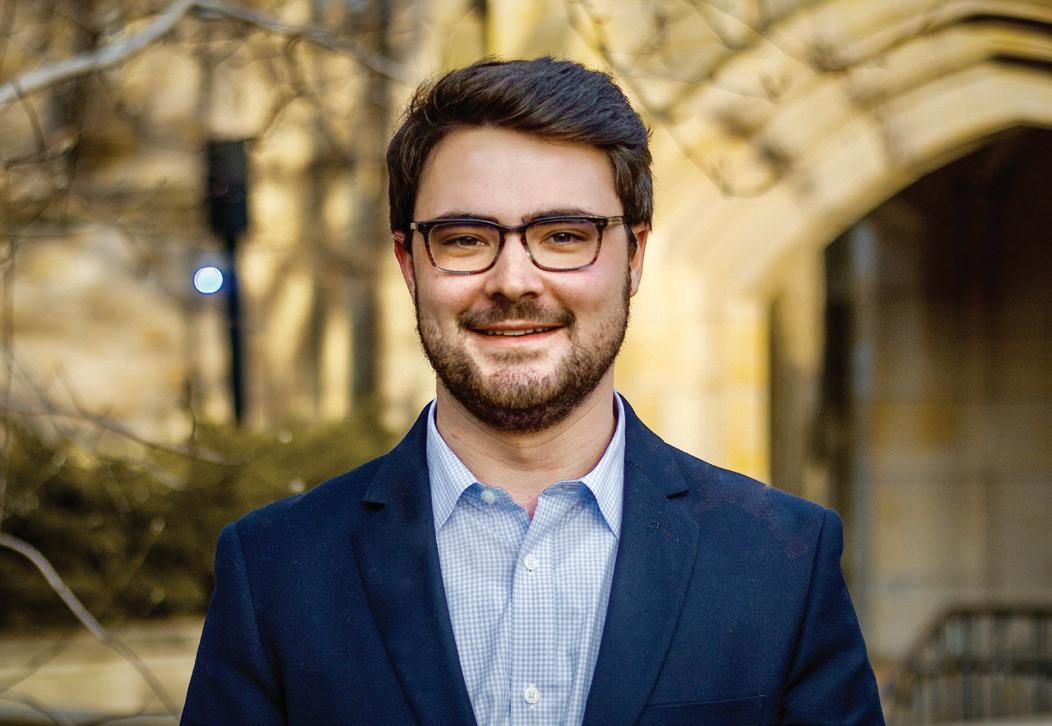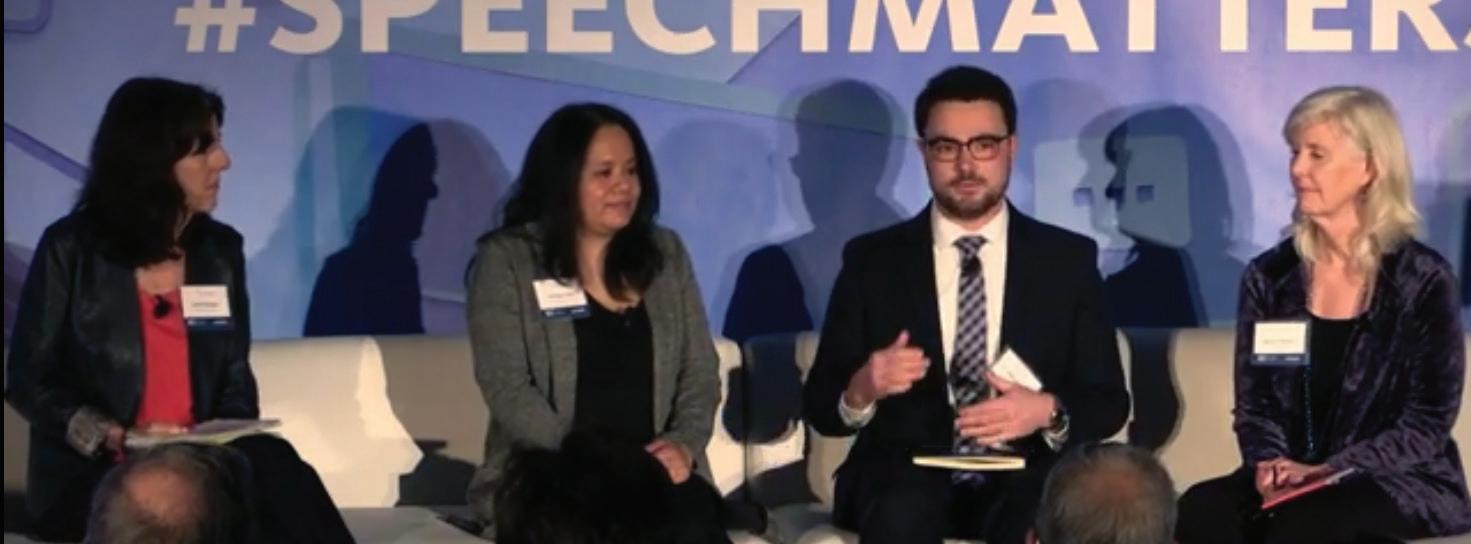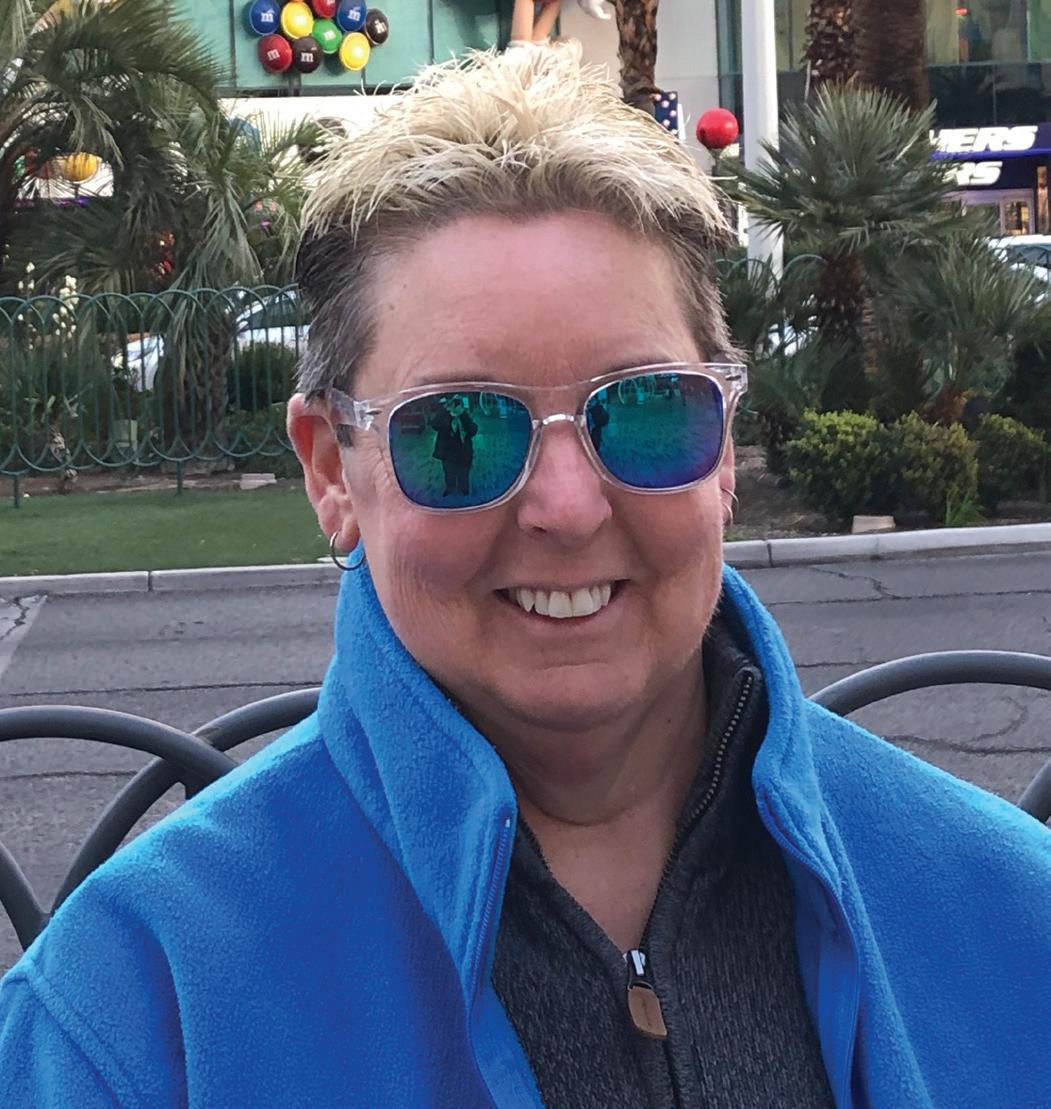
8 minute read
JONATHON SCHWARTZ
SCHWARTZ
PURSUES VOTING INITIATIVES
Advertisement
Jonathan Schwartz (’13) is one of the founders and leaders of
Every Vote Counts, and in the fall of 2019, he was invited to sit
on a panel entitled “Cast Your Vote: How Students are Shaping
American Democracy” at the #SpeechMatters event at the
University of California. A junior at Yale, Schwartz is pursuing
a double major in Economics and Statistics and Data Science
as well as an Advanced Language Certificate in Spanish. Yet
his education in the classroom is only part of his story. And he
credits his experience at Sycamore as a driver in his ability to
juggle his classroom education, his extracurricular work, and his
desire to push himself to become a leader.
Schwartz says his interest in the voting process started during his
senior year at North Central High School.
“During the fall of my senior year at North Central High
School, I was involved with a campaign to pass two funding
referenda for Washington Township Schools and to elect the
school board candidates endorsed by our district’s parents’ and
teachers’ associations,” he says. “My job was to represent the student perspective to the campaign’s steering committee and, in
turn, to encourage my fellow students to support our campaign.”
Along with a few friends, including Sycamore and North
Central classmate, Joey Mervis, Schwartz founded Students for
MSDWT (Metropolitan School District of Washington Township) with
a twofold mission: to organize students around the particular
campaigns they were working on; and, more broadly, to
encourage high school students to engage meaningfully in the
school board politics that directly impact their everyday lives.
“Our success was incredible,” he says of the high school program.
“Over the course of a few short months, we engaged hundreds of
students in phone banking, door knocking, and voter registration. I’ve
always been interested in politics, and I chose these particular causes
to work on because I care deeply about maintaining high-quality
public schools and wanted to do everything I could to support the
teachers and administrators who had done so much to support me.”
Fast forward to his freshman year at Yale in 2017, and
Schwartz found himself at the first Every Vote Counts (EVC)
meeting in the basement of the Yale library with around 30
students. He says he realized that our democracy, with a voting
turnout of less than half of his age group, could be in trouble,
and he wanted to do what he could to reverse this course.
He joined EVC with the aspiration of building a national, non
partisan organization dedicated to increasing voter turnout and
civic engagement on college campuses. Since then, they’ve built
the organization at Yale, hired a full time staff, and expanded
to nearly 50 chapters around the country. In addition to his
leadership as a founder of the organization, Schwartz serves
both as Director of Voter Engagement for the Yale chapter and a
member of EVC’s National Advisory Board.
In this role as leader of the Yale “Every Vote Counts” group,
Schwartz was surprised to learn a large reason for low voter
turnout for young voters. “I figured there were students like us all around the country organizing and mobilizing to ensure our
generation was heard at the ballot box. To my surprise, I learned
that I was terribly wrong. People ages 18-24 voted at the lowest
rate of any age group: a mere 43%.”
After three years in the field, Schwartz learned a sobering truth:
he was finding that young people aren’t voting because they don’t
believe their vote, or their right to vote, matters.
“Troublingly, over the past few years, it’s become clear to me that
what we’re facing now is more than just a failure of our election
system. We’re facing a crisis of faith in our democracy. I care
about voting because I care about our democracy. Americans, and
especially those in my generation, too often forget that American
democracy is an experiment, not a rule. It’s something that must be
continually supported and nurtured with our participation and care.”
As Schwartz learned more about the voting habits of those in his age
group, he found recent history showed turnout in this age group had
not risen above 50%. Learning this fired Schwartz up to continue his quest to get young voters involved in the process, and to the polls. Or
as he says, “fight to engage my generation in our democracy.”
In it for the long game, Schwartz says they want to work on
continuing to expand the organizations reach and create new
chapters around the country. That will allow reach beyond the 2020
election, as they institute ideas that promote civic engagement as a
year-round lifestyle rather than an election-centered exercise.
“While we’ve grown and learned a lot as an organization, our
core mission has remained the same: to increase voter turnout and
expand voter access nationwide through engagement, education,
and reform. We do this by leading inclusive voter engagement
efforts on our campuses, advocating for expanded ballot access at
the federal and state levels, and educating our communities about
the importance of civic leadership.”
While he is neck-deep in what he is taking on in college, Schwartz
says his Sycamore experiences have shaped how he continues to
tackle his education and his work outside of the classroom. “I realize that what made Sycamore so special and so instrumental
in my educational career is not what I learned, though I’ll never
forget the hundreds of roots, prefixes, and suffixes I learned in Ms. O’Malley’s class or the story of the Battle of Balaklava as told by
Mr. Young,” he says. “But that I learned how to learn. I learned the
importance of thinking, reading, and writing critically, the value of
asking questions and of exploring primary sources, and the need to
take notes and organize myself in a way that works for me.”
One of his favorite teachers was Tony Young, the longtime
Middle School History teacher. “On top of the energy and
genuine care he brings to the classroom every day, Mr. Young
teaches young people how to be informed and engaged caretakers
of our democracy.” Schwartz remembers how Young would ask
students to form an argument about the use of the atomic bomb,
discuss student protest and participation during the Cold War
era, or host Supreme Court simulations. “Mr. Young consistently
encouraged us to form and debate our opinions and to think
critically about our government and our history.”
“I have a lot of different titles with a lot of different groups,”
he says. “But my role in all of them is the same: to think about
ways we can best develop a culture and community of voter
participation and civic engagement on campus.”
In addition to his roles with EVC, Schwartz is a leader of the
Yale Votes Taskforce, a committee chartered by the Associate
Vice President of Student Life and the Yale College Council
with the goals of improving voter turnout on Yale’s campus and
coordinating voter engagement efforts across the university. He is
also a member of the National Student Board, and the Director
of Voter Engagement for Yale’s chapter.
“In each of these roles, I develop resources, tools, and best practices
to conduct voter engagement efforts on college campuses and share
them with our partners around the country,” he says. Schwartz
represents Yale at the Ivy League Votes Challenge, which is a
coalition of students from each of the eight Ivy League schools
formed to coordinate efforts and set goals for civic engagement on

campuses. He also leads the Yale Census Coalition, a coalition of
student organizations working together to ensure a complete count
of the Yale and New Haven Communities in the 2020 Census.
“I’m not entirely sure what I’d like to do immediately after college,
though I’m fairly confident that I’d like to go to law school at some point,” says Schwartz, who worked as an intern on Senator Joe
Donnelly’s campaign in 2018 and as a Summer Legislative Assistant
at the Anti-Defamation League in 2019. This summer, he was
scheduled to be working at a leading economic consulting firm in Washington, D.C. That is on hold during the Coronavirus shutdown.
“I know with certainty, though, that whatever I do, I’ll find a
way, either as a vocation or avocation, to continue working on
the issues I care deeply about.”
While it might seem like a lot of work for a college student to
fill the many self-created roles during the year, Schwartz has a
boundless passion and energy for the jobs. One of his passions is
his work for the University of California’s “National Center for
Free Speech and Civic Engagement on Campus.”
“One of the Center’s cornerstone programs is its annual
#SpeechMatters conference. This year, I had the incredible
honor of speaking at the conference on a panel entitled ‘Cast
Your Vote: How Students are Shaping American Democracy.’” He also authored the Center’s recent Speech Spotlight
publication: Engaging Student Voters.
“It’s incredibly important to mention just how much has changed
since I started this voter work in 2017. At the beginning, I figured
low voter turnout was a mechanical problem. I thought lack of
enthusiasm and the difficulty of the process were the primary
reasons young people were failing to vote.”
What he has discovered is the perceived lack of influence felt by young voters within the voting process. As he mentioned in his panel
speech at the #SpeechMatters Conference, the only American
democracy his generation knows has been one “manipulated by
politicians on both sides of the aisle, interest groups, and foreign
governments.” He says it should come with little surprise that now, a
generation of disfunction is starting to take its toll.
“What this means is not that we should give up, but that we
need to fight harder for a future we can all believe in and
rededicate ourselves to the American values that have allowed
our democracy to thrive in the past. It means we need to reclaim
an American patriotism by debating our opinions, criticizing our
leaders, and participating in our democratic process. It means
we need to listen to young people’s thoughts and experiences and
convince them that our democracy can work for them, too.
“It’s what makes our country extraordinary and it’s why I’m
proud to be an American.” n









